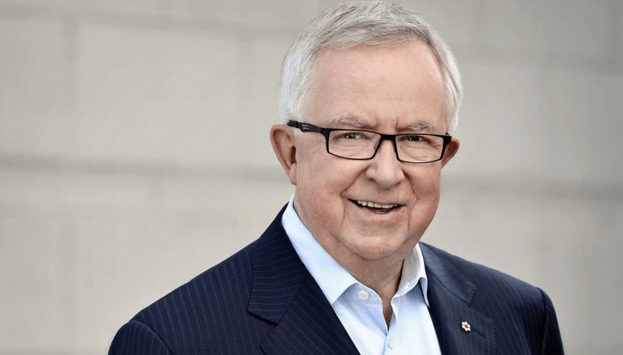The Quite Honourable Joe Clark
L. Ian MacDonald
June 4, 2019
This is a big week for Joe Clark.
On June 4th, 40 years ago, Clark was sworn in as Canada’s 16th prime minister. And June 5th marks his 80th birthday.
Through all the years, in triumph and turmoil, the man from High River has marked these milestones with the two women in his life; his wife, longtime Ottawa lawyer Maureen McTeer, and their daughter, respected media talent Catherine Clark.
When Clark was opposition leader in the early 1980s, he was on the road one night at the Queen Elizabeth Hotel in Montreal, where I’d met him for an interview. Catherine, perhaps four or five at the time, skipped into the room in a lovely red dress.
“Hello, Muffin,” Clark called after her, before resuming an interview.
Some 35 years on, attending a dinner at the Château Laurier in Ottawa, we recalled that evening at the Queen E.
“You called her Muffin,” I reminded him.
“I still do,” Clark replied with a smile.
“He still does,” laughed McTeer, sitting next to him.
His daughter has a definite take on being Miss Muffin.
“My Dad,” said Catherine recently, “is the only one allowed to call me that.”
She’s 42 now, with two school-age children of her own and a thriving career as an Ottawa-based TV host and event moderator. She never betrays a know-it-all bent in her gracious hosting of Sixth Estate’s popular Before the Bell panels at the National Arts Centre, but it’s always apparent that she’s done her homework, with a gift of cutting to the chase in the nicest way. Perhaps a trait she inherited from a father known for his lack of Trumpian strutting.
“I’m not sure he thinks of himself as an elder statesman,” she says of her dad’s legacy, which has been burnished by time, “but it’s an appropriate term for him.”
And 15 years after he gave up the partisan practice of politics, she says, “he continues with projects that enhance democracy. He’s very committed to democratic institutions.”
For one thing, as she notes, there’s his vice chairmanship of the Global Leadership Foundation, to which he has brought a track record of ideas and a broad network of international colleagues and contacts that spans political divides and regional interests.
In recent history, there’s been an honest broker role for middle powers, especially Canada, and particularly for strong Canadian foreign ministers. Clark’s resumé offers a strong case that he’s one of two outstanding Canadians foreign ministers of the modern era, second only to Lester B. Pearson, whose name is on the Sussex Drive building where Clark worked for the better part of a decade.
The Clark years were marked not only by his role in shaping foreign policy for the government of Brian Mulroney, but also by the respect and courtesy with which he treated career officials at the building known as Fort Pearson, as well as in Canadian diplomatic postings worldwide.
“He valued the people with whom he worked, the experts in his department,” says his daughter.
And as prime minister in 1979, he opened Canada’s doors to the Vietnamese boat people. Like other refugees fleeing famine or despotism for this nation of immigrants, they came for freedom and a better life.
One of them, a handyman, came to fix something at Stornoway, after Clark had left office and returned to his role as opposition leader. He wouldn’t accept payment for his work, saying to McTeer, “I will never take money from you. It’s the least I can do.”
“They knew of Dad’s role in that, and for them it was a critical time in their lives,” says Catherine.
As Mulroney’s foreign minister, Clark also played a significant role in Canada’s campaign for the release of Nelson Mandela after nearly three decades and the end of South Africa’s racist apartheid system.
That was no easy cause, as Mulroney lobbied other world leaders, including the formidable Margaret Thatcher, against what he called “the scourge of apartheid.”
By the time of Mandela’s release in 1990, Mulroney and Clark had become partners on foreign policy, a long way from their campaigns against one another for the Conservative leadership, won by Clark and 1976 and Mulroney in 1983.
When it was once mentioned to Clark that he had been very gracious in accepting a role in Mulroney’s cabinet, he replied that it was gracious of Mulroney to have offered him Foreign Affairs. In cabinet as well as in the House, and in the councils of the Progressive Conservative Party, Clark’s role as an unfailingly steadfast team player was appreciated both by Mulroney and the PMO brain trust, which came to see him as a reliable, low-maintenance, high-value asset to the government.
Now, 40 years on from the 1979 election that made him prime minister in a minority Parliament, Clark’s role is well remembered and his reputation secured, not just for his honorifics, but for his character.
Deservedly so.

